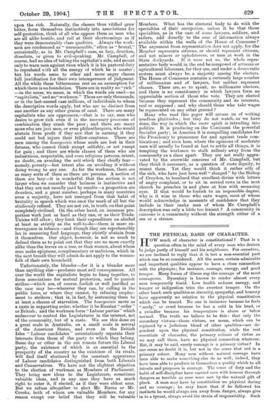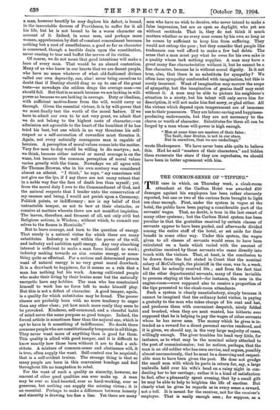H OW much of character is constitutional ? That is a
question often in the mind of every man who desires to judge justly of himself and his neighbours. For ourselves, we are inclined to reply that it is but a non-essential part which can be so considered. All the same, certain admirable and important qualities appear to have a close connection with the physique; for instance, courage, energy, and good temper. Many forms of illness sap the courage of the most courageous. Dysentery is known to render almost every man temporarily timid. Low health reduces energy, and hunger or indigestion tries the sweetest temper. On the other hand, such qualities as sincerity, sympathy, and honesty have apparently no relation to the physical constitution which can be traced. No one is insincere because he feels " seedy," or cruel because he has a cold in his bead, or a swindler because his temperature is above or below normal. The truth we believe to be this : that only the secondary virtues—those virtues, we mean, which can be replaced by a judicious blend of other qualities—are de- pendent upon the physical constitution, while the real essentials of character, the primary colours of virtue as we may call them, have no physical connection whatever. But, it may be said, surely courage is a primary virtue ? In one sense no doubt it is, but not in the sense that red is a primary colour. Many men without natural courage have been able to make something else do as well; indeed, they have been able to produce in themselves a quality which to all intents and purposes is courage. The sense of duty and the habit of self-discipline have carried men with 'honour through dangers as terrible as ever were met by the natural gift of pluck. A man may have by constitution no physical daring and no courage ; he may know that if he followed his instincts he would always run away from danger, always give in to a tyrant, always avoid the strain of responsibility. Such
a man, however heartily he may deplore his defect, is bound, in the inscrutable decrees of Providence, to suffer for it all his life, but he is not bound to be a worse character on account of it. Indeed, in some men, and perhaps more women, apprehension by dint of constant concealment becomes nothing but a root of unselfishness, a good so far as character is concerned, though a terrible drain upon the constitution, never ceasing to tear and buffet the nerves of its victim.
Of course, we do not mean that good intentions will make a hero of every man. That would be an absurd contention.
Many of us who know in our hearts that we are decent people, who have no sense whatever of what old-fashioned divines called our own depravity, can, alas ! never bring ourselves to doubt that if Destiny should drag us up to one of the great tests—as nowadays she seldom drags the average man—we should fail. But that is as much because we are lacking in will- power as because we are lacking in courage. Duty or idealism, with sufficient motive-force from the will, would carry us through. Given the essential virtues, it is by will-power that we must finally test the worth of the moral Suture. If we have to admit our own to be not very great, we admit that we do not belong to the highest caste of character,—an admission not agreeable to the heart of the humblest if he has tried his best, but one which in no way threatens his self- respect as a self-accusation of cowardice must threaten it. Again, not every naturally courageous man is capable of heroism. A perception of moral values comes into the matter. Very few men to-day would be willing to die martyrs ; not, we think, because either natural or moral courage is on the wane, but because the common perception of moral values varies greatly with the times. Nowadays we all agree with Sir Thomas Browne, who in his own century was considered almost an atheist. " I think," he says, " my conscience will not give me the lye, if I say there are not many extant that in a noble way fear the face of death less than myself ; yet, from the moral duty I owe to the Commandment of God, and the natural respects that I tender unto the conservation of my essence and being, I would not perish upon a Ceremony, Politick points, or indifferency : nor is my belief of that untractable temper, as not to bow at their obstacles, or connive at matters wherein there are not manifest impieties. The leaven, therefore, and ferment of all, not only civil but Religious actions, is Wisdom; without which, to commit our selves to the flames is Homicide."
But to leave courage, and turn to the question of energy. That surely is a natural virtue for which there are many substitutes. Industry is well within the power of the will, and industry and ambition spell energy. Any very absorbing interest is sufficient to make a man force himself to work ; industry making towards an aim creates energy, or some- thing quite as effectual. For a serious and determined person want of natural energy is no very great moral drawback. It is a drawback to happiness, for it means as a rule that a man has nothing but his work. Among cultivated people who make their living by their brains none but the naturally energetic have any hobbies. The man who has constrained himself to work has no force left to make himself play. But this is not a defect of character. A good temper, again, is a quality for which substitutes may be found. The poorer classes are probably born with no more tendency to anger than any other class ; yet how much more easily they seem to be provoked. Kindness, self-command, and a cheerful habit of mind serve the same purpose as good temper. Indeed, the forced article is sometimes finer than the natural one, which is apt to have in it something of indifference. No doubt there are some people who are constitutionally temperate in all things. They never want more of anything than is good for them. This quality is allied with good temper, and it is difficult to know exactly how those born without it are to find a sub- stitute. A mixture of common-sense and abstinence will, it is true, often supply the want. Self-control can be acquired; that is a self-evident truism. The strange thing is that so many people are born in this convenient bondage and feel throughout life no temptation to rebel.
For the want of such a quality as sincerity, however, no amount of other good qualities can ever make up. A man may be ever so kind-hearted, ever so hard-working, ever so generous, but nothing can supply the missing virtue ; it is an essential. Perhaps to make a difference between honesty and sincerity is drawing too fine a line. Yet there are many men who have no wish to deceive, who never intend to make a false impression, but are as open as daylight, who yet are without rectitude. That is, they do not think it much matters whether or no every man comes by his own so long as he comes by sufficient to keep him from suffering. They would not entrap the poor ; but they consider that people like tradesmen can well afford to make a few bad debts. The sense that a man must pay what he owes for his own sake is a quality whose lack nothing supplies. A man may have a great many fine characteristics without it, but he cannot be a fine character, because he is without moral dignity. Is it not true, also, that there is no substitute for sympathy ? We often hear sympathy confounded with imagination, but this is surely incorrect. Want of imagination may narrow the scope of sympathy, but the imagination of genius itself may exist without it. A man may be able to picture his neighbour's situation to a nicety, but his talent will only serve him for description, it will not make him feel sorry, or glad either. All the virtues which depend upon temperament are of immense use to their possessors. They are labour-saving and happiness- producing endowments, but they are not necessary to the charm or worth of character. Substitutes for them all can be forged by a man whose will-power is high enough.
" Men at some time are masters of their fates : The fault, dear Brutus, is not in our stars, But in ourselves, that we are underlings," wrote Shakespeare. We have never been able quite to believe this. Had he said "masters of their characters," and bidden them exonerate the stars if they are reprobates, we should have been in better agreement with him.



















































 Previous page
Previous page